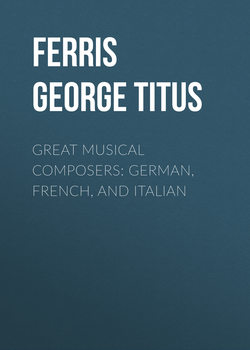Читать книгу Great Musical Composers: German, French, and Italian - Ferris George Titus - Страница 18
HAYDN
IV
ОглавлениеHaydn landed in England after a voyage which delighted him in spite of his terror of the sea – a feeling which seems to be usual among people of very high musical sensibilities. In his diary we find recorded – “By four o’clock we had come twenty miles. The large vessel stood out to sea five hours longer, till the tide carried it into the harbour. I remained on deck the whole passage, in order to gaze my fill at that huge monster – the ocean.”
The novelty of Haydn’s concerts – of which he was to give twenty at fifty pounds apiece – consisted of their being his own symphonies, conducted by himself in person. Haydn’s name, during his serene, uneventful years with the Esterhazys, had become world-famous. His reception was most brilliant. Dinner parties, receptions, invitations without end, attested the enthusiasm of the sober English; and his appearance at concerts and public meetings was the signal for stormy applause. How, in the press of all this pleasure in which he was plunged, he continued to compose the great number of works produced at this time, is a marvel. He must have been little less than a Briareus. It was in England that he wrote the celebrated Salomon symphonies – the “twelve grand,” as they are called. They may well be regarded as the crowning-point of Haydn’s efforts in that form of writing. He took infinite pains with them, as, indeed, is well proved by an examination of the scores. More elaborate, more beautiful, and scored for a fuller orchestra than any others of the one hundred and twenty or thereabouts which he composed, the Salomon set also bears marks of the devout and pious spirit in which Haydn ever laboured.
It is interesting to see how, in many of the great works which have won the world’s admiration, the religion of the author has gone hand-in-hand with his energy and his genius; and we find Haydn not ashamed to indorse his score with his prayer and praise, or to offer the fruits of his talents to the Giver of all. Thus, the symphony in D (No. 6) bears on the first page of the score the inscription, “In nomine Domini: di me Giuseppe Haydn, maia 1791, in London;” and on the last page, “Fine, Laus Deo, 238.”
That genius may sometimes be trusted to judge of its own work may be gathered from Haydn’s own estimate of these great symphonies.
“Sir,” said the well-satisfied Salomon, after a successful performance of one of them, “I am strongly of opinion that you will never surpass these symphonies.”
“No!” replied Haydn; “I never mean to try.”
The public, as we have said, was enthusiastic; but such a full banquet of severe orchestral music was a severe trial to many, and not a few heads would keep time to the music by steady nods during the slow movements. Haydn, therefore, composed what is known as the “Surprise” symphony. The slow movement is of the most lulling and soothing character, and about the time the audience should be falling into its first snooze, the instruments having all died away into the softest pianissimo, the full orchestra breaks out with a frightful BANG. It is a question whether the most vigorous performance of this symphony would startle an audience nowadays, accustomed to the strident effects of Wagner and Liszt. A wag in a recent London journal tells us, indeed, that at the most critical part in the work a gentleman opened one eye sleepily and said, “Come in.”
Simple-hearted Haydn was delighted at the attention lavished on him in London. He tells us how he enjoyed his various entertainments and feastings by such dignitaries as William Pitt, the Lord Chancellor, and the Duke of Lids (Leeds). The gentlemen drank freely the whole night, and the songs, the crazy uproar, and smashing of glasses were very great. He went down to stay with the Prince of Wales (George IV.), who played on the violoncello, and charmed the composer by his kindness. “He is the handsomest man on God’s earth. He has an extraordinary love of music, and a great deal of feeling, but very little money.”
To stem the tide of Haydn’s popularity, the Italian faction had recourse to Giardini; and they even imported a pet pupil of Haydn, Pleyel, to conduct the rival concerts. Our composer kept his temper, and wrote, “He [Pleyel] behaves himself with great modesty.” Later we read, “Pleyel’s presumption is a public laughing-stock;” but he adds, “I go to all his concerts and applaud him.”
Far different were the amenities that passed between Haydn and Giardini. “I won’t know the German hound,” says the latter. Haydn wrote, “I attended his concert at Ranelagh, and he played the fiddle like a hog.”
Among the pleasant surprises Haydn had in England was his visit to Herschel, the great astronomer, in whom he recognised one of his old oboe-players. The big telescope amazed him, and so did the patient star-gazer, who often sat out-of-doors in the most intense cold for five or six hours at a time.
Our composer returned to Vienna in May 1795, with the little fortune of 12,000 florins in his pocket.
